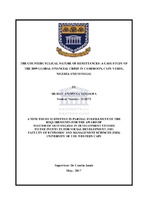The countercyclical nature of remittances: A case study of the 2009 global financial crisis in Cameroon, Cape Verde, Nigeria and Senegal
Abstract
Remittances inflows have gradually become one of the major sources of external financial
inflows to developing countries. As a result, research abounds on the developmental effects
of remittances in the home countries of migrants. At the micro level, recipients of remittances
are more likely to have better access to quality health care, education as well as start-up fund
for their own businesses. On the other hand at the macro level, remittances inflows can help
increase the credit worthiness of countries by enabling them to use future remittances inflows
as collateral for loans. Additionally, remittances inflows as a source of foreign exchange can
be used by countries to fund import bills. Although there has been a surge of scholarship on
remittances, this scholarship seems to be concentrated on the economic study of migration
instead of the macroeconomic aspects of remittances. Furthermore, comparative studies on
these macroeconomic aspects of remittances especially on African countries are underresearched
and remains at the backwaters of academic study.
Using quantitative time series data, this research seeks to do a comparative study on the
countercyclical nature of remittances in four selected West African countries (Cameroon,
Cape Verde, Nigeria and Senegal). The research used descriptive trend analysis,
autocorrelation and an ARMAX model analyse the research problem. After critical analysis
on whether remittances are countercyclical or not using the 2009 global financial crisis as a
reference year in these four countries, it was found that, remittance inflows to Cameroon,
Cape Verde, Nigeria and Senegal were pro-cyclical in nature. Moreover, in analysing the
relationship between remittances inflows and gross domestic product (economic growth) the
research revealed that there was a positive relationship between remittances inflows and
economic growth for the four countries (Cameroon, Cape Verde, Nigeria and Senegal)
observed. One recommendation given from this study is that, there is the need for remittances
inflows to be invested in productive activities. This is because even if remittances continue to
increase, without its investment in productive sectors, it cannot have any meaningful impact
on economic growth in these countries.

